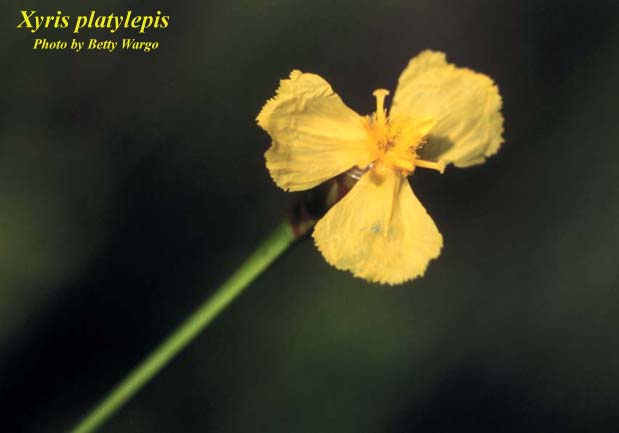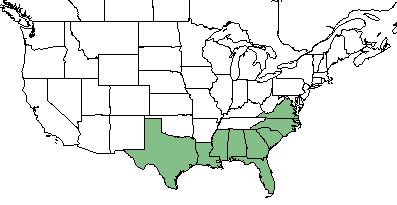Difference between revisions of "Xyris platylepis"
Rwagner914 (talk | contribs) (Created page with "{{subst:Template:PlantName}}") |
HaleighJoM (talk | contribs) (→Ecology) |
||
| (20 intermediate revisions by 6 users not shown) | |||
| Line 1: | Line 1: | ||
{{italic title}} | {{italic title}} | ||
| + | Common names: tall yelloweyed grass | ||
<!-- Get the taxonomy information from the NRCS Plants database --> | <!-- Get the taxonomy information from the NRCS Plants database --> | ||
{{taxobox | {{taxobox | ||
| − | | name = | + | | name = Xyris platylepis |
| − | | image = | + | | image = Xyris_platylepis_AFP.jpg |
| − | | image_caption = Photo by | + | | image_caption = Photo by Betty Wargo hosted at [http://florida.plantatlas.usf.edu/photo.aspx?ID=2208 Atlas of Florida Plants] |
| regnum = Plantae | | regnum = Plantae | ||
| divisio = Magnoliophyta - Flowering plants | | divisio = Magnoliophyta - Flowering plants | ||
| − | | classis = Liliopsida - Moncots | + | | classis = Liliopsida - Moncots |
| − | | ordo = | + | | ordo = Commelinales |
| − | | familia = | + | | familia = Xyridaceae |
| − | | genus = '' | + | | genus = ''Xyris'' |
| − | | species = ''''' | + | | species = '''''X. platylepis''''' |
| − | | binomial = '' | + | | binomial = ''Xyris platylepis'' |
| − | | binomial_authority = | + | | binomial_authority = Kunth |
| − | | range_map = | + | | range_map = XYRI_PLAT_DIST.JPG |
| − | | range_map_caption = Natural range of '' | + | | range_map_caption = Natural range of ''Xyris platylepis'' from USDA NRCS [https://plants.usda.gov/core/profile?symbol=XYPL Plants Database]. |
}} | }} | ||
==Taxonomic Notes== | ==Taxonomic Notes== | ||
| + | Synonyms: none | ||
| + | |||
| + | Varieties: none | ||
| + | |||
==Description== | ==Description== | ||
<!-- Basic life history facts such as annual/perrenial, monoecious/dioecious, root morphology, seed type, etc. --> | <!-- Basic life history facts such as annual/perrenial, monoecious/dioecious, root morphology, seed type, etc. --> | ||
| + | ''X. platylepis'' is a native perennial forb that is a member of the Xyridaceae family.<ref name= "USDA"> USDA Plants Database URL: https://plants.usda.gov/core/profile?symbol=XYPL</ref> Leaves are linear, 20-40 cm long and 5-10 mm wide, mostly smooth. Outermost leaves are scale-like, and quickly turn to a dull brown color. Spike is broadly elliptic or oblong, with closely imbricate bracts. Seeds are ellipsoidal approximately 0.5 mm long.<ref name= "Kral"> Kral, R. (1960). "The genus Xyris in Florida." Rhodora 62(743): 295-319.</ref> | ||
| + | |||
==Distribution== | ==Distribution== | ||
| + | The native distribution of ''X. platylepis'' consists of the Southeast United States, ranging from eastern Texas to southern Virginia. It has been introduced to Hawaii's main island.<ref name= "USDA"/> | ||
| + | |||
==Ecology== | ==Ecology== | ||
===Habitat=== <!--Natural communities, human disturbed habitats, topography, hydrology, soils, light, fire regime requirements for removal of competition, etc.--> | ===Habitat=== <!--Natural communities, human disturbed habitats, topography, hydrology, soils, light, fire regime requirements for removal of competition, etc.--> | ||
| − | < | + | ''X. platylepis'' can be found in savannahs, sandhill seeps, and ditches as human disturbed habitats throughout its distribution.<ref name= "Weakley"> Weakley, A. S. (2015). Flora of the Southern and Mid-Atlantic States. Chapel Hill, NC, University of North Carolina Herbarium.</ref> This includes moist to wet sands as well as sandy peats of pineland pond margins, bogs and marshes. <ref name= "Kral"/> ''X. platylepis'' has also been observed in a range of habitats including wet loamy sand between pine woods and cypress-gum swamps, moist sand on grassy roadsides, moist sandy loam, wet peat, and sphagnous bog.<ref name= "Herbarium"/> Preferred habitat for ''X. platyepis'' is seepage-fed habitats with herbaceous seepage slopes with mesic or wet flatwoods and prairies or cypress domes that include Sphagnum mosses.<ref name ="FFE">Observation by Edwin Bridges, Highlands County Fl., August 3, 2015, posted to Florida Flora and Ecosystematics Facebook Group.</ref> |
| + | |||
| + | ===Phenology=== <!--Timing off flowering, fruiting, seed dispersal, and environmental triggers. Cite PanFlora website if appropriate: http://www.gilnelson.com/PanFlora/ --> | ||
| + | Flowering time ranges from August until November in the season.<ref name= "Herbarium"> Florida State University Robert K. Godfrey Herbarium database. URL: http://herbarium.bio.fsu.edu. Last accessed: May 2018. Collectors: Loran C. Anderson, Cecil R. Slaughter, Robert K. Godfrey, Rodie White, Robert L. Lazor, R. Kral, Chas. C. Deam, R. E. Perdue, Jr., O. Lakela, and Richard S. Mitchell. States and Counties: Florida: Wakulla, Franklin, Gadsden, Volusia, Suwannee, Levy, Baker, Leon, Liberty, Orange, Highlands, Brevard, De Soto, Hillsborough, and Manatee. Alabama: Lowndes. Georgia: Grady.</ref> | ||
<!--===Seed dispersal===--> | <!--===Seed dispersal===--> | ||
<!--===Seed bank and germination===--> | <!--===Seed bank and germination===--> | ||
| − | + | ||
| + | ===Fire ecology===<!--Fire tolerance, fire dependence, adaptive fire responses--> | ||
| + | Populations of ''Xyris platylepis'' have been known to persist through repeated annual burning.<ref>Platt, W.J., R. Carter, G. Nelson, W. Baker, S. Hermann, J. Kane, L. Anderson, M. Smith, K. Robertson. 2021. Unpublished species list of Wade Tract old-growth longleaf pine savanna, Thomasville, Georgia.</ref> | ||
<!--===Pollination===--> | <!--===Pollination===--> | ||
| − | <!--=== | + | <!--===Herbivory and toxicology=== <!--Common herbivores, granivory, insect hosting, poisonous chemicals, allelopathy, etc.--> |
| − | <!--==Diseases and parasites==--> | + | <!--===Diseases and parasites===--> |
| − | ==Conservation and | + | ==Conservation, cultivation, and restoration== |
| − | == | + | ==Cultural use== |
==Photo Gallery== | ==Photo Gallery== | ||
<gallery widths=180px> | <gallery widths=180px> | ||
</gallery> | </gallery> | ||
==References and notes== | ==References and notes== | ||
Latest revision as of 17:35, 18 July 2022
Common names: tall yelloweyed grass
| Xyris platylepis | |
|---|---|

| |
| Photo by Betty Wargo hosted at Atlas of Florida Plants | |
| Scientific classification | |
| Kingdom: | Plantae |
| Division: | Magnoliophyta - Flowering plants |
| Class: | Liliopsida - Moncots |
| Order: | Commelinales |
| Family: | Xyridaceae |
| Genus: | Xyris |
| Species: | X. platylepis |
| Binomial name | |
| Xyris platylepis Kunth | |

| |
| Natural range of Xyris platylepis from USDA NRCS Plants Database. | |
Contents
Taxonomic Notes
Synonyms: none
Varieties: none
Description
X. platylepis is a native perennial forb that is a member of the Xyridaceae family.[1] Leaves are linear, 20-40 cm long and 5-10 mm wide, mostly smooth. Outermost leaves are scale-like, and quickly turn to a dull brown color. Spike is broadly elliptic or oblong, with closely imbricate bracts. Seeds are ellipsoidal approximately 0.5 mm long.[2]
Distribution
The native distribution of X. platylepis consists of the Southeast United States, ranging from eastern Texas to southern Virginia. It has been introduced to Hawaii's main island.[1]
Ecology
Habitat
X. platylepis can be found in savannahs, sandhill seeps, and ditches as human disturbed habitats throughout its distribution.[3] This includes moist to wet sands as well as sandy peats of pineland pond margins, bogs and marshes. [2] X. platylepis has also been observed in a range of habitats including wet loamy sand between pine woods and cypress-gum swamps, moist sand on grassy roadsides, moist sandy loam, wet peat, and sphagnous bog.[4] Preferred habitat for X. platyepis is seepage-fed habitats with herbaceous seepage slopes with mesic or wet flatwoods and prairies or cypress domes that include Sphagnum mosses.[5]
Phenology
Flowering time ranges from August until November in the season.[4]
Fire ecology
Populations of Xyris platylepis have been known to persist through repeated annual burning.[6]
Conservation, cultivation, and restoration
Cultural use
Photo Gallery
References and notes
- ↑ 1.0 1.1 USDA Plants Database URL: https://plants.usda.gov/core/profile?symbol=XYPL
- ↑ 2.0 2.1 Kral, R. (1960). "The genus Xyris in Florida." Rhodora 62(743): 295-319.
- ↑ Weakley, A. S. (2015). Flora of the Southern and Mid-Atlantic States. Chapel Hill, NC, University of North Carolina Herbarium.
- ↑ 4.0 4.1 Florida State University Robert K. Godfrey Herbarium database. URL: http://herbarium.bio.fsu.edu. Last accessed: May 2018. Collectors: Loran C. Anderson, Cecil R. Slaughter, Robert K. Godfrey, Rodie White, Robert L. Lazor, R. Kral, Chas. C. Deam, R. E. Perdue, Jr., O. Lakela, and Richard S. Mitchell. States and Counties: Florida: Wakulla, Franklin, Gadsden, Volusia, Suwannee, Levy, Baker, Leon, Liberty, Orange, Highlands, Brevard, De Soto, Hillsborough, and Manatee. Alabama: Lowndes. Georgia: Grady.
- ↑ Observation by Edwin Bridges, Highlands County Fl., August 3, 2015, posted to Florida Flora and Ecosystematics Facebook Group.
- ↑ Platt, W.J., R. Carter, G. Nelson, W. Baker, S. Hermann, J. Kane, L. Anderson, M. Smith, K. Robertson. 2021. Unpublished species list of Wade Tract old-growth longleaf pine savanna, Thomasville, Georgia.